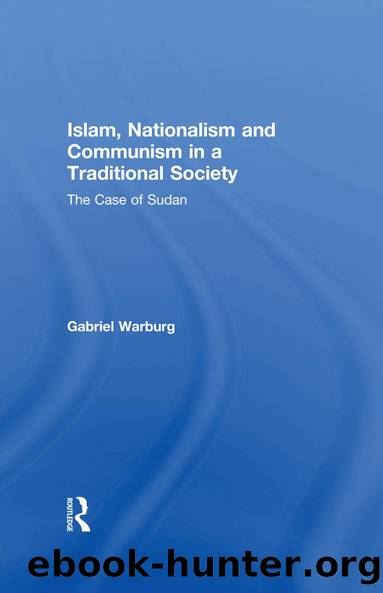Islam, Nationalism and Communism in a Traditional Society by Gabriel Warburg

Author:Gabriel Warburg [Warburg, Gabriel]
Language: eng
Format: epub
Tags: History, Middle East, General, Social Science, Regional Studies
ISBN: 9781135164782
Google: FKhlAgAAQBAJ
Publisher: Routledge
Published: 2013-12-19T01:21:28+00:00
THE FAILURE OF THE JULY 1971 COUP AND NUMEIRIâS RESUMPTION OF POWER
Major HÄshim al-âAá¹Äâ acted before Numeiriâs orders to arrest him had been executed, and on the morning of 19 July 1971, he and his collaborators managed to capture the presidential palace and to put Numeiri and his colleagues under arrest. 113 In his first decree, al-âAá¹Äâ declared the Sudan an independent democratic republic and announced the abrogation of the laws promulgated by Numeiriâs régime and the dissolution of the organisations it had established. The programme of the new régime included the establishment of a âdemocratic political systemâ based on mass participation, in which all popular organisations would be represented; regional autonomy would be granted to the South; an âindustrial and agricultural revolutionâ would take place and âpursue a non-capital path for development, which approaches the horizon of socialismâ. In the sphere of international relations the programme advocated support of the Palestinian cause and of national liberation movements and a struggle against colonialism and neo-colonialism together with the third world and with the friendly socialist countries headed by the Soviet Union.114
Of the three leaders of the coup, only al-âAá¹Äâ was in the Sudan on 19 July. His two colleagues, BÄbikr al-NÅ«r âUthmÄn and FÄrÅ«q âUthmÄn ḤamdallÄh, were at the time in London which tends to prove that the coup was executed in a hurry â probably as a result of Numeiriâs actions. The three leaders were among the founders of the âFree Officersâ movement and had served both on the RCC and in the government until they were ousted in Numeiriâs anti-communist purge in November 1970. Their communist leanings in the past were well known and freely admitted but it is questionable whether they retained their loyalty to the party and followed the dictates of its leadership in later years. However, it is beyond doubt that following the coup, al-âAá¹Äâ approached the SCP to help him draft the policies of the new régime and organise the popular support it needed. But despite the aid of the SCP, the trade unions, the students and other professional associations, the new régime did not survive for more than seventy-two hours.
This was probably the result of lack of preparation of the coup which in turn led to some fatal mistakes in its execution. First, while al-âAá¹Äâ had gained the support of the troops in the capital, he neglected to induce those in the provinces to come to his side. Second, the two other leaders of the coup were arrested by the Libyans when the latter intercepted the BOAC aircraft which carried them back to Khartoum. Thus, al-âAá¹Äâ was left to deal with the situation single-handed.115 Third, the pronounced pro-communist views of the new régime were bound to arouse suspicions and fear among many Sudanese, including the army. Last, al-âAá¹Äâ did not fully realise that despite his promises of continued friendship with Egypt, President SÄdÄt would not be pleased with the deposal of Numeiri and instead do his utmost to help him regain power. In fact SÄdÄt acted wisely.
Download
This site does not store any files on its server. We only index and link to content provided by other sites. Please contact the content providers to delete copyright contents if any and email us, we'll remove relevant links or contents immediately.
The PFLP's Changing Role in the Middle East by Harold M. Cubert(155)
100 myths about the Middle East by Fred Halliday(139)
Revolution Without Revolutionaries by Bayat Asef(114)
US Nation-Building in Afghanistan by Conor Keane(112)
The Emergence of the Gulf States by J. E. Peterson(106)
Islam, Nationalism and Communism in a Traditional Society by Gabriel Warburg(93)
A Grammar of Ugaritic by John Screnock; Vladimir Olivero(86)
All the World Is Awry by R. Kevin Lacey(77)
The Islamic Polity and Political Leadership: Fundamentalism, Sectarianism, and Pragmatism by Mehran Tamadonfar(71)
Islamic Law in Circulation by Mahmood Kooria;(56)
Islam, Nationalism and Communism in a Traditional Society: The Case of Sudan by Gabriel Warburg(52)
Amazigh Politics in the Wake of the Arab Spring by Bruce Maddy-Weitzman(44)
